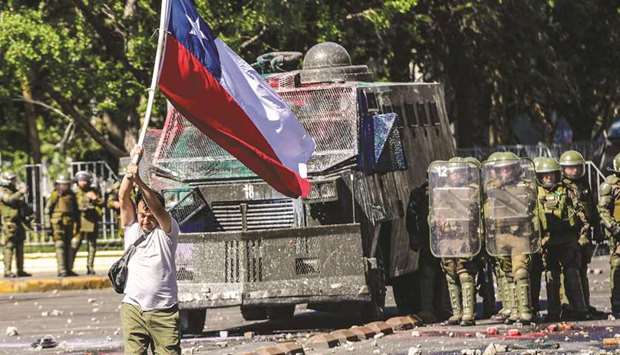Tear gas lingered in the air in downtown Santiago yesterday as Chilean commuters made their way to work following another night of fire, looting and riots, in a sign that a Cabinet reshuffle by President Sebastian Pinera was still not enough.
Hooded vandals emerged suddenly late on Monday following a largely peaceful day of protests, wreaking destruction on many downtown streets and sowing chaos amid a melee of fire trucks, protesters banging pots and heavy black smoke.
Pinera’s newly appointed spokeswoman Karla Rubilar condemned the continuing violence, saying it did not reflect the wishes of the majority.
More than a million Chileans marched peacefully against inequality in Santiago last Friday.
It was the largest protest since Chile’s return to democracy in 1990.
“We are talking about 6,500 people who think they can take over Santiago, but we will find them,” Rubilar told reporters, ruling out a return to a military-enforced state of emergency in the capital.
The continuing unrest in Chile follows a week of riots, arson and protests over inequality that has left at least 17 dead.
Thousands were arrested, prosecutors said, and Chilean businesses lost more than $1.4bn.
The city’s metro suffered nearly $400mn in damages.
Pilar Zofoli, a 30-year-old schoolteacher, said the violence and destruction to public spaces and services was making life miserable for Santiago’s working class.
“I support this cause, but I don’t like the way things are going,” she said. “In the end, this affects us, not the rich.”
With Pinera’s popularity at an all-time low, Chileans on social media once again called for another round of marches
Many schools, shopping centres and businesses closed early yesterday for fear of more violence.
Protests over a hike in metro fares spun out of control earlier this month, prompting Pinera to pledge worker-friendly social and economic reforms.
The centre-right billionaire has vowed to boost the minimum wage and pensions, lower the prices of medicines and public transport and assure proper health insurance.
Many have said the reforms are still not enough.
Pinera on Monday replaced eight members of his Cabinet, including his interior and finance ministers.
Chile, the world’s top copper producer, has long boasted one of Latin America’s most prosperous and open free-market economies.
A plummeting copper price and global trade tensions, however, have dragged on the export-oriented economy and exposed entrenched inequality.
The protests that broke out last week resembled similar scenes around the world in recent months, with demonstrators from Hong Kong to Barcelona angry at ruling elites.
Firefighters late on Monday battled flames in a downtown tower, home to a medical centre and a popular hotel, not far from the iconic Santa Lucia hill.
Tourists had been evacuated from the hotel the previous week amid the riots.
A putrid blend of smouldering fire and tear gas hung heavily in the morning air hours later.
Many Chileans in business attire wore makeshift masks or wet towels over their faces as they headed to work.
Catalina Barrera, an 18-year-old high school student, said she felt Pinera’s announcements had missed the mark. The protests would go on, she said.
“If, after that massive march on Friday, we get nothing but a Cabinet change in which they continue to nominate more of the same people, then violence is our only option,” she told Reuters.
Students, unions and other social groups have joined the Chile protests in massive numbers, yet a leader or spokesperson has yet to emerge.
Chile’s fractured opposition parties have supported the demonstrations but have not led them, leaving a power vacuum that has hindered negotiation.
Support for Pinera, meanwhile, has plunged to just 14%, the lowest approval rating for a Chilean president since the return to democracy, a Cadem poll showed.

A demonstrator holding the Chilean national flag walks in front of a police vehicle during a protest in Santiago.
